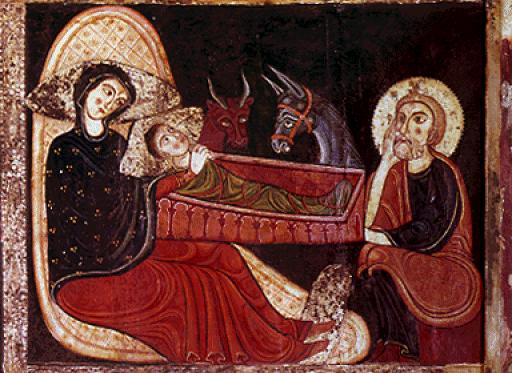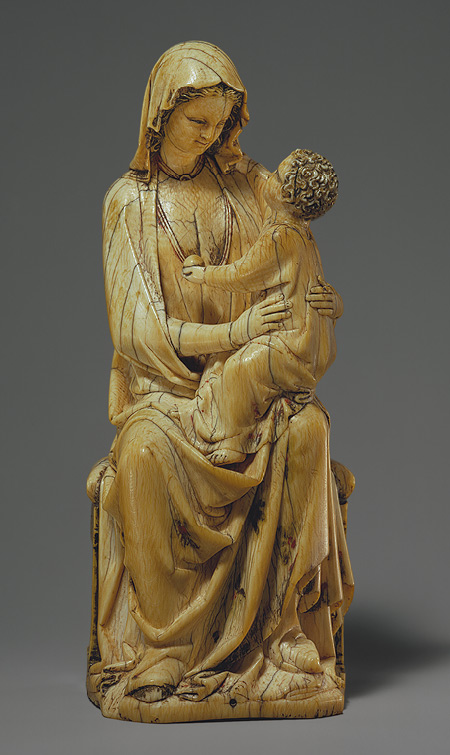Beata viscera
Marie virginis
cuius ad ubera
rex magni nominis;
veste sub altera
vim celans numinis
dictavit federa
Dei et hominis
O mira novitas
et novum gaudium,
matris integrita
post puerperium.
|
|
Blessed flesh
of the Virgin Mary,
at whose breasts
the king of eminent name,
concealing, under altered guise,
the force of divine nature,
has sealed a pact
of God and Man
O astonishing novelty
and unaccustomed joy
of a mother still pure
after childbirth.
|
Populus gentium
sedens in tenebris
surgit ad gaudium
partus tam celebris:
Iudea tedium
fovet in latebris,
cor gerens conscium
delicet funebris,
O mira novitas
et novum gaudium,
matris integrita
post puerperium.
|
|
The people of the nations
huddling in the darkness
rise up at the joy
of so celebrated a birth.
Judea nourishes its resentment
in the shadows,
its heart bearing the knowledge
of the fatal crime.
O astonishing novelty
and unaccustomed joy
of a mother still pure
after childbirth.
|
Fermenti pessimi
qui fecam hauserant,
ad panis azimi
promisa properant:
sunt Deo proximi
qui longe steterant,
et hi njovissimi
qui primi fuerant.
O mira novitas
et novum gaudium,
matris integrita
post puerperium.
|
|
Those who drunk the dregs
of the most villanous ferment
hasten at the promises
of unleavened bread;
they are the ones
who had long stood close to God
and these the newest
who were first.
O astonishing novelty
and unaccustomed joy
of a mother still pure
after childbirth.
|
Partum quem destruis,
Iudea misera!
De quo nos argues,
quem docet littera;
si nova respuis,
crede vel vetera,
in hoc quem astruis
Christum considera.
O mira novitas
et novum gaudium,
matris integrita
post puerperium.
|
|
The birth which you destroy
O wretched Judea!
of him whom you denounce to us
because he teaches the law;
if you refuse the new law
then believe the old law,
in this One, whom you accuse,
behold the Christ.
O astonishing novelty
and unaccustomed joy
of a mother still pure
after childbirth.
|
Te semper implicas
errore patrio;
dum viam indicas
errans in invio:
in his que predicas,
sternis in medio
bases propheticas
sub evangelio.
O mira novitas
et novum gaudium,
matris integrita
post puerperium.
|
|
You entangle yourself always
in the ancestral error;
as you point the way
wandering aimlessly:
among those things which you preach
you strew into the midst
the prophetic foundations,
below the gospel.
O astonishing novelty
and unaccustomed joy
of a mother still pure
after childbirth.
|
Legis mosayce
clausa misteria;
nux virge mystice
nature nescia;
aqua de silice,
columpna previa,
prolis dominice
signa sunt propera.
O mira novitas
et novum gaudium,
matris integrita
post puerperium.
|
|
The mysteries of the Mosaic Law
have been closed;
the fruit of the mystical rod
is unknown to nature;
water from a stone,
a column leading the way,
are early signs
for the people of God
.
O astonishing novelty
and unaccustomed joy
of a mother still pure
after childbirth.
|
Solem, quem librere,
Dum purus otitur
In aura cernere
visus non patitur,
cernat a latere
dum repercutitur,
alvus puerpere,
qua totus clauditur.
O mira novitas
et novum gaudium,
matris integrita
post puerperium.
|
|
Vision does not endure
to behold in its radiance
the sun, unconcealed,
as he rises forth, pure.
Let the wholly enclosed womb
of the woman delivered of child
behold from the side
as it is reflected.
O astonishing novelty
and unaccustomed joy
of a mother still pure
after childbirth.
|
|
|
Translation: Barbara DeMarco |


